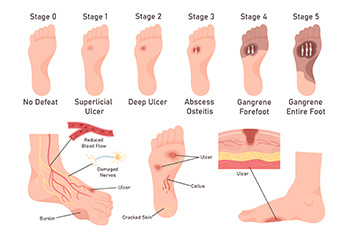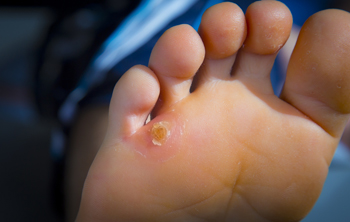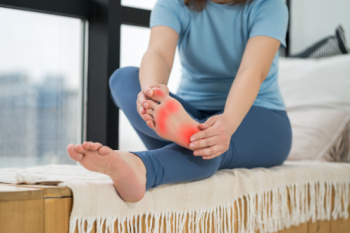Connect With Us
Blog
Items filtered by date: November 2024
Are You Suffering From Ingrown Toenails?
How Diabetes Affects the Feet

Diabetes can have a significant impact on foot health due to poor circulation and nerve damage. High blood sugar levels over time can lead to diabetic neuropathy, a condition that affects the nerves, particularly in the feet. This nerve damage may cause a loss of feeling, making it difficult to detect injuries, blisters, or infections. Reduced blood flow can also slow the healing process making minor foot problems more serious. People with diabetes are at a higher risk of developing foot ulcers, infections, and other complications. Dry skin, fungal infections, and poor wound healing are common concerns. To manage foot health, individuals with diabetes should regularly check their feet for any signs of damage, wear well-fitted shoes, and maintain proper foot hygiene. If you have diabetes, it is strongly suggested that you schedule regular visits to a podiatrist who can help you to manage this serious condition.
Diabetic foot care is important in preventing foot ailments such as ulcers. If you are suffering from diabetes or have any other concerns about your feet, contact Tanisha Richmond, DPM from Richmond Foot & Ankle, LLC. Our doctor can provide the care you need to keep you pain-free and on your feet.
Diabetic Foot Care
Diabetes affects millions of people every year. The condition can damage blood vessels in many parts of the body, especially the feet. Because of this, taking care of your feet is essential if you have diabetes, and having a podiatrist help monitor your foot health is highly recommended.
The Importance of Caring for Your Feet
- Routinely inspect your feet for bruises or sores.
- Wear socks that fit your feet comfortably.
- Wear comfortable shoes that provide adequate support.
Patients with diabetes should have their doctor monitor their blood levels, as blood sugar levels play such a huge role in diabetic care. Monitoring these levels on a regular basis is highly advised.
It is always best to inform your healthcare professional of any concerns you may have regarding your feet, especially for diabetic patients. Early treatment and routine foot examinations are keys to maintaining proper health, especially because severe complications can arise if proper treatment is not applied.
If you have any questions please feel free to contact our office located in Dayton, OH . We offer the newest diagnostic and treatment technologies for all your foot and ankle needs.
Custom Orthotics For Ankle Stability

Step with assurance, thanks to enhanced ankle stability from orthotics! If you're active and on the move, Custom Orthotics are your ally for stronger, steadier ankles. They align your foot and ankle, reducing the risk of sprains and offering solid support for every stride. Don’t let instability hold you back. Try Custom Orthotics from our office, and discover unshakable confidence in every step!
What Is a Foot Corn?

Foot corns, also known as clavus, are thickened areas of skin that develop in response to friction and pressure. They commonly appear on the top or sides of the toes, as well as on the soles of the feet. The primary causes of corns include wearing ill-fitting shoes that rub against the feet, engaging in repetitive activities, and having abnormal foot mechanics. Symptoms typically include localized pain, tenderness, and a hard, raised bump on the skin. While corns are generally harmless, they can become uncomfortable and lead to further complications if not addressed. Preventive measures, such as choosing properly fitting footwear, can help reduce the risk of developing corns. If you have developed a corn that is uncomfortable or painful, it is suggested that you consult a podiatrist who can offer you effective relief and prevention tips.
If you have any concerns regarding your feet and ankles, contact Tanisha Richmond, DPM of Richmond Foot & Ankle, LLC. Our doctor will treat your foot and ankle needs.
Corns: What Are They? and How Do You Get Rid of Them?
Corns can be described as areas of the skin that have thickened to the point of becoming painful or irritating. They are often layers and layers of the skin that have become dry and rough, and are normally smaller than calluses.
Ways to Prevent Corns
There are many ways to get rid of painful corns such as wearing:
- Well-fitting socks
- Comfortable shoes that are not tight around your foot
- Shoes that offer support
Treating Corns
Treatment of corns involves removing the dead skin that has built up in the specific area of the foot. Consult with Our doctor to determine the best treatment option for your case of corns.
If you have any questions please feel free to contact our office located in Dayton, OH . We offer the newest diagnostic and treatment technologies for all your foot and ankle needs.
It's Time for Beautiful Feet
Treatment for Plantar Fasciitis

Plantar fasciitis causes heel pain due to inflammation of the plantar fascia, a thick band of tissue connecting the heel to the toes. This condition often affects those who are obese, pregnant, or on their feet frequently, including athletes and active workers. Symptoms include a stabbing pain at the bottom of the heel, usually worse in the morning or after prolonged rest. While plantar fasciitis can sometimes develop without specific triggers, factors such as improper footwear, high-impact activities, and prolonged standing can contribute to its onset. Diagnosis is typically based on medical history and physical examination. The condition can persist for several months if untreated, but rest and wearing supportive footwear can speed recovery. In chronic cases, options like orthotics, corticosteroid injections, and alternative therapies may be recommended to alleviate pain and promote healing. If you have developed plantar fasciitis, it is suggested that you schedule an appointment with a podiatrist for treatment.
Plantar fasciitis is a common foot condition that is often caused by a strain injury. If you are experiencing heel pain or symptoms of plantar fasciitis, contact Tanisha Richmond, DPM from Richmond Foot & Ankle, LLC. Our doctor can provide the care you need to keep you pain-free and on your feet.
What Is Plantar Fasciitis?
Plantar fasciitis is one of the most common causes of heel pain. The plantar fascia is a ligament that connects your heel to the front of your foot. When this ligament becomes inflamed, plantar fasciitis is the result. If you have plantar fasciitis you will have a stabbing pain that usually occurs with your first steps in the morning. As the day progresses and you walk around more, this pain will start to disappear, but it will return after long periods of standing or sitting.
What Causes Plantar Fasciitis?
- Excessive running
- Having high arches in your feet
- Other foot issues such as flat feet
- Pregnancy (due to the sudden weight gain)
- Being on your feet very often
There are some risk factors that may make you more likely to develop plantar fasciitis compared to others. The condition most commonly affects adults between the ages of 40 and 60. It also tends to affect people who are obese because the extra pounds result in extra stress being placed on the plantar fascia.
Prevention
- Take good care of your feet – Wear shoes that have good arch support and heel cushioning.
- Maintain a healthy weight
- If you are a runner, alternate running with other sports that won’t cause heel pain
There are a variety of treatment options available for plantar fasciitis along with the pain that accompanies it. Additionally, physical therapy is a very important component in the treatment process. It is important that you meet with your podiatrist to determine which treatment option is best for you.
If you have any questions, please feel free to contact our office located in Dayton, OH . We offer the newest diagnostic and treatment technologies for all your foot care needs.
Essential Shoes for Nurses

Nurses spend long hours on their feet, making the right footwear vital for comfort and health. Clogs and crocs are popular choices due to their easy slip-on design and excellent arch support. These styles offer cushioning and are often made from materials that provide breathability, helping to keep feet comfortable throughout the day. Tennis sneakers are also favored, as they provide stability and support for various movements required in a healthcare setting. Specialized healthcare-focused footwear is designed with features like anti-slip soles and antimicrobial properties, ensuring both safety and hygiene. Prioritizing comfort in shoe selection can help reduce fatigue, prevent foot pain, and lower the risk of injury. Foot injuries can happen from wearing the wrong shoes during the work day. If this applies to you, it is suggested that you consult a podiatrist who can treat various foot conditions, and offer you advice about proper workday footwear.
While working on the feet, it is important to take the proper care of them. For more information about working on your feet, contact Tanisha Richmond, DPM from Richmond Foot & Ankle, LLC. Our doctor will treat your foot and ankle needs.
Working on Your Feet
Standing on your feet for long periods of time can cause stress and pain in your feet. Your whole body may experience change in terms of posture, back pain, bunions, callouses and or plantar warts. There are ways to avoid these conditions with proper foot care, smart choices and correct posture.
Positive Changes
Negative heeled shoe – Choosing this shoe type places the heel slightly lower than the ball of the foot. These are great for overall foot health. Find shoes that fit you correctly.
Go barefoot – Our feet were not designed to be enclosed for all hours of the day. Try to periodically expose your feet to air.
Eliminate Pain
Foot Exercises – Performing simple exercises, incorporating yoga and doing stretches are beneficial. This will allow increased blood flow to the area and muscles of the foot.
Achilles tendon – Stretching the foot out flat on the floor will relax the calf muscles and tendon. These exercises can be performed almost anywhere. Make sure you add these exercises to your daily regimen.
With a little bit of this information and knowing more about foot health, you will notice changes. Foot stretches and proper footwear will help with pain and prevent further issues.
If you have any questions please feel free to contact our office located in Dayton, OH . We offer the newest diagnostic and treatment technologies for all your foot and ankle needs.
Blog Archives
- April 2025
- March 2025
- February 2025
- January 2025
- December 2024
- November 2024
- October 2024
- September 2024
- August 2024
- July 2024
- June 2024
- May 2024
- April 2024
- March 2024
- February 2024
- January 2024
- December 2023
- November 2023
- October 2023
- September 2023
- August 2023
- July 2023
- June 2023
- May 2023
- April 2023
- March 2023
- February 2023
- January 2023
- December 2022
- November 2022
- October 2022
- September 2022
- August 2022
- July 2022
- June 2022
- May 2022
- April 2022
- March 2022
- February 2022
- January 2022
- December 2021
- November 2021
- October 2021
- September 2021
- August 2021
- July 2021
- June 2021
- May 2021
- April 2021
- March 2021
- February 2021
- January 2021
- December 2020
- November 2020
- October 2020
- September 2020
- August 2020
- July 2020
- June 2020
- May 2020
- April 2020
- March 2020
- February 2020
- January 2020
- December 2019
- November 2019
- October 2019
- September 2019
- August 2019
- July 2019
- June 2019
- May 2019
- April 2019
- March 2019
- February 2019
- January 2019
- December 2018
- November 2018

